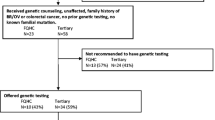Abstract
Tumor profiling (TP) is primarily used to identify driver mutations within a tumor for treatment purposes, but it may also identify germline mutations. Current involvement of cancer genetic counselors (GCs) in the TP process is not clear. Members of the National Society of Genetic Counselors Cancer Special Interest Group were invited to participate in a confidential, web-based survey to characterize current practices and attitudes related to the use of TP. Of 105 useable responses, 86.7% of GCs reported their institutions were using TP, although only 6.7% did this routinely. Although 63.7% reported personal involvement in the process, largely with result interpretation and follow-up germline testing, 69.7% reported seeing fewer than 5 patients for this reason and 97.9% desired further education on this topic. Work and regional setting were not predictors of involvement with TP; however, GCs in the academic setting were less aware of who obtains consent (p = 0.001). GCs reported they were not often utilized as a resource regarding TP. Overall, GCs believed TP is beneficial in identifying hereditary cancer syndromes, although most reported finding a germline mutation in <10% of cases. This study provides a snapshot of current GC involvement with TP, and documents the desire by GCs for additional education on tumor profiling.

Similar content being viewed by others
References
Boland, P. M., Ruth, K., Matro, J. M., Rainey, K. L., Fang, C. Y., Wong, Y. N., et al. (2015). Genetic counselors’ (GC) knowledge, awareness, understanding of clinical next-generation sequencing (NGS) genomic testing. Clinical Genetics, 88(6), 565–572.
Dancey, J. E., Bedard, P. L., Onetto, N., & Hudson, T. J. (2012). The genetic basis for cancer treatment decisions. Cell, 148(3), 409–420.
Douma, K. L., Meiser, B., Kirk, J., Mitchell, G., Saunders, C., Rahman, B., et al. (2015). Health professionals’ evaluation of delivering treatment-focused genetic testing to women newly diagnosed with breast cancer. Familial Cancer, 14(2), 265–272.
Everett, J., Gustafson, S., & Raymond, V. (2014). Traditional roles in a non-traditional setting: genetic counseling in precision oncology. Journal of Genetic Counseling, 23(4), 655–660.
Jain, R., Savage, M. J., Forman, A. D., Mukherji, R., & Hall, M. J. (2016). The relevance of hereditary cancer risks to precision oncology: what should providers consider when conducting tumor genomic profiling? Journal of the National Comprehensive Cancer Network, 14(6), 795–806.
Johnston, J. J., Rubinstein, W. S., Facio, F. M., Ng, D., Singh, L. N., Teer, J. K., et al. (2012). Secondary variants in individuals undergoing exome sequencing: screening of 572 individuals identifies high-penetrance mutations in cancer-susceptibility genes. The American Journal of Human Genetics, 91(1), 97–108.
Kou, T., Kanai, M., Matsumoto, S., Okuno, Y., & Muto, M. (2016). The possibility of clinical sequencing in the management of cancer. Japanese Journal of Clinical Oncology, 46(5), 399–406.
Lolkema, M. P., Gadellaa-van Hooijdonk, C. G., Bredenoord, A. L., Kapitein, P., Roach, N., Cuppen, E., et al. (2013). Ethical, legal, and counseling challenges surrounding the return of genetic results in oncology. Journal of Clinical Oncology, 31(15), 1842–1848.
Meiser, B., Tucker, K., Friedlander, M., Barlow-Stewart, K., Lobb, E., Saunders, C., et al. (2008). Genetic counselling and testing for inherited gene mutations in newly diagnosed patients with breast cancer: a review of the existing literature and a proposed research agenda. Breast Cancer Research, 10(6), 216.
Mirnezami, R., Nicholson, J., & Darzi, A. (2012). Preparing for precision medicine. New England Journal of Medicine, 366(6), 489–491.
National Comprehensive Cancer Network. (2016). Clinical practice guidelines in oncology. Genetic/Familial High-Risk Assessment: Breast and Ovarian. Version 1.2017. Retrieved September 24, 2016, from National Comprehensive Cancer Network website: www.nccn.org.
National Society of Genetic Counselors. (2014a). NSGC Professional Status Survey Cancer Genetics Analysis 2014. Retrieved March 12, 2016, from National Society of Genetic Counselors website: www.nsgc.org.
National Society of Genetic Counselors. (2014b). NSGC Professional Status Survey 2014. Retrieved March 12, 2016, from National Society of Genetic Counselors website: www.nsgc.org.
Robson, M. E., Bradbury, A. R., Arun, B., Domchek, S. M., Ford, J. M., Hampel, H. L., et al. (2015). American Society of Clinical Oncology policy statement update: genetic and genomic testing for cancer susceptibility. Journal of Clinical Oncology, 33(31), 3660–3667.
Stratton, M. R., Campbell, P. J., & Futreal, P. A. (2009). The cancer genome. Nature, 458(7239), 719–724.
Varga, E., Chao, E., & Yeager, N. (2015). The importance of proper bioinformatics analysis and clinical interpretation of tumor genomic profiling: a case study of undifferentiated sarcoma and a constitutional pathogenic BRCA2 mutation and an MLH1 variant of uncertain significance. Familial Cancer, 14(3), 481–485.
Weitzel, J. N., Lagos, V. I., Cullinane, C. A., Gambol, P. J., Culver, J. O., Blazer, K. R., et al. (2007). Limited family structure and BRCA gene mutation status in single cases of breast cancer. Journal of the American Medical Association, 297(23), 2587–2595.
Acknowledgements
Thanks to Todd Foster, PhD, who provided the statistical analysis for this study.
Author information
Authors and Affiliations
Corresponding author
Ethics declarations
Conflict of Interest
L. Goedde, N. Stupiansky, M. Lah, K. Quaid and S. Cohen declare that they have no conflict of interest.
Human Studies and Informed Consent
All procedures followed were in accordance with the ethical standards of the responsible committee on human experimentation (institutional and national) and with the Helsinki Declaration of 1975, as revised in 2000. Written informed consent was not required by St. Vincent Institutional Review Board (#R20150119) because no identifying information was collected, but informed consent was implied when subjects opted to take the survey.
Animal Studies
No animal studies were carried out by the authors for this article.
Rights and permissions
About this article
Cite this article
Goedde, L.N., Stupiansky, N.W., Lah, M. et al. Cancer Genetic Counselors’ Current Practices and Attitudes Related to the Use of Tumor Profiling. J Genet Counsel 26, 878–886 (2017). https://doi.org/10.1007/s10897-017-0065-z
Received:
Accepted:
Published:
Issue Date:
DOI: https://doi.org/10.1007/s10897-017-0065-z




